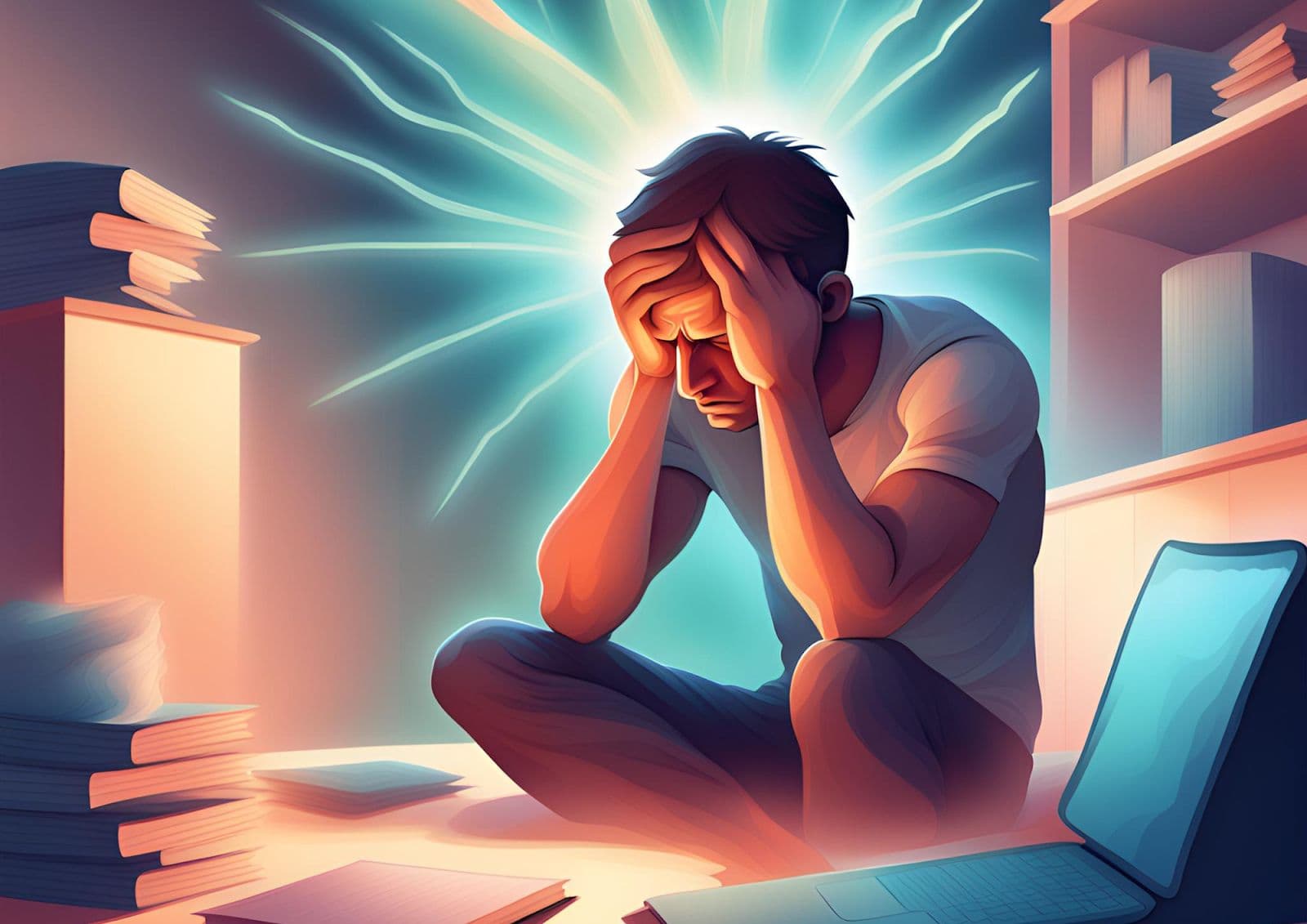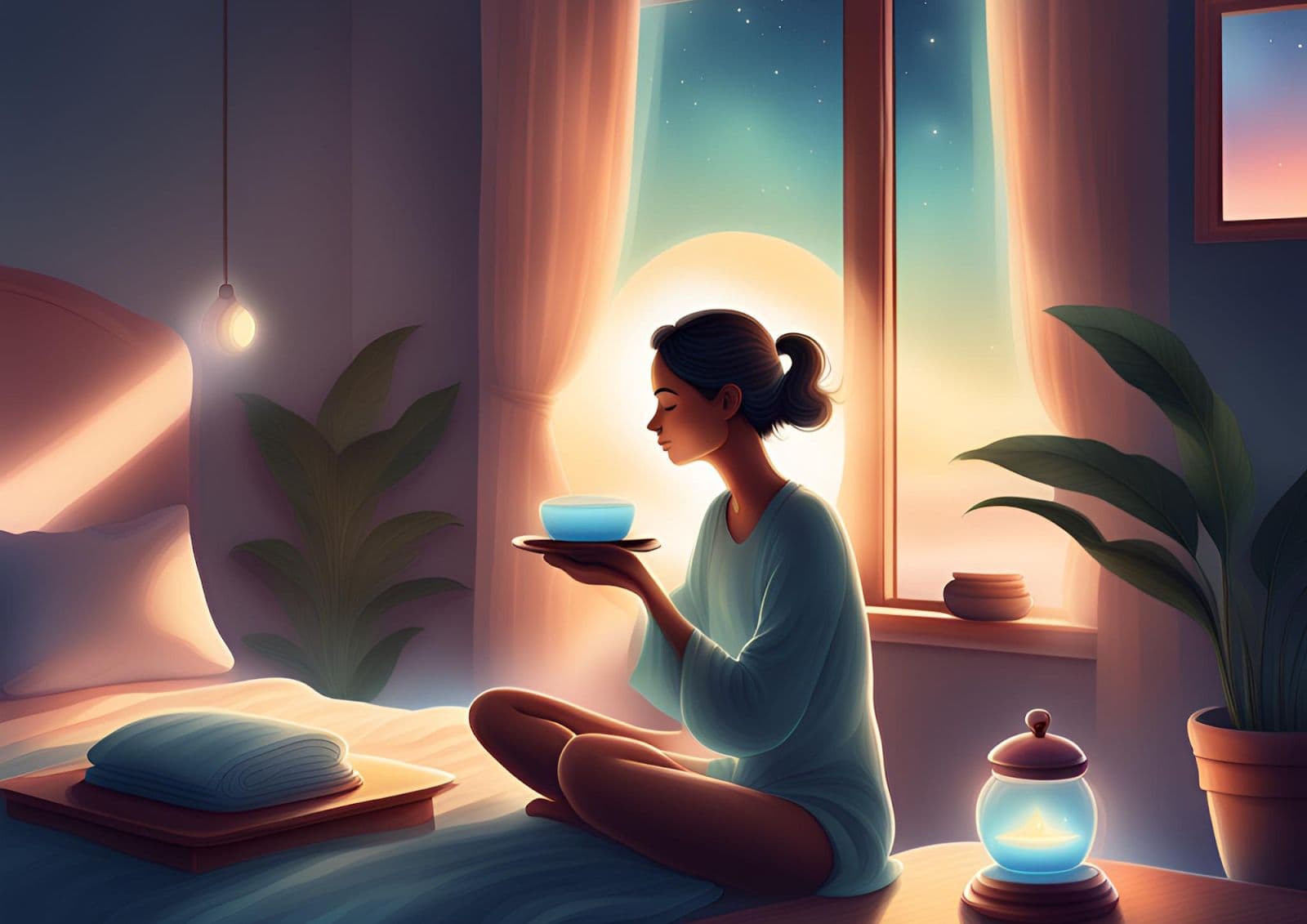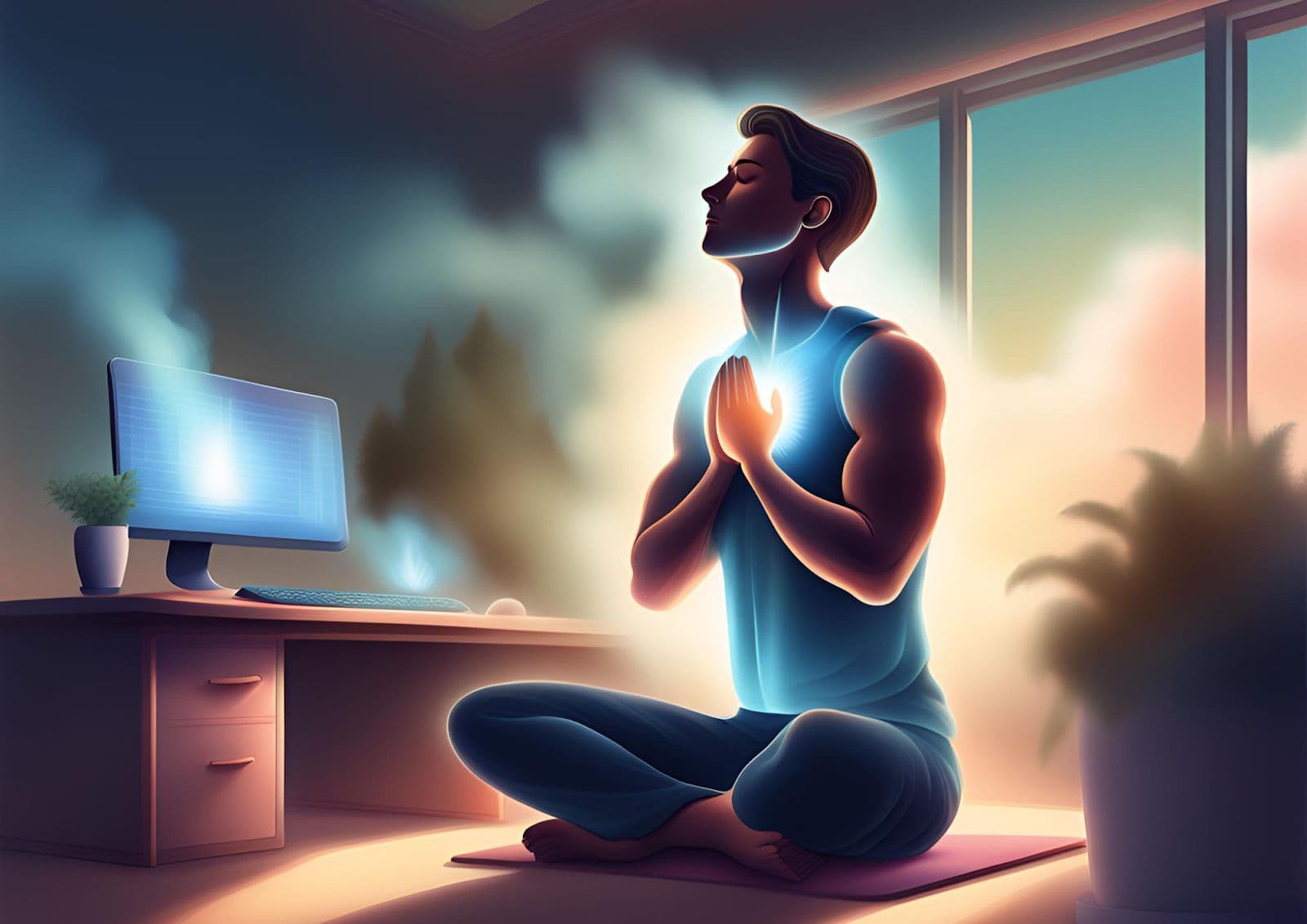With so much chaos going on in the world, it's no surprise that anxiety levels are on the rise. The endless pressure we get from existential threats, work and family obligations and changing economic and political climates can often leave us feeling overwhelmed, stressed, and anxious. The constant influx of information and the expectation to be readily available for the next change further taxes our biology, creating an allostatic load and creating a mental state of unease.
However, there are effective daily practices that can significantly help us find peace and reduce anxiety levels. These practices are not mere temporary fixes but foundational habits that, when consistently incorporated into our routines, can foster a sense of calm amongst the chaos.

Understanding Anxiety
What is Anxiety?
Anxiety refers to anticipation of a future threat or worry of what’s to come. While fear is an emotional response to an immediate threat, anxiety involves feelings of apprehension, dread, and restlessness. It is often characterized by feelings of tension, worried thoughts, sleeplessness and physical changes like increased blood pressure. While some anxiety is a normal part of life and can occasionally be beneficial in some situations as it helps us stay alert and focused, chronic anxiety can interfere with daily activities and overall well-being.
Common Triggers of Anxiety
Anxiety can be triggered by a variety of factors, both internal and external, and can vary from person to person but often include:
- Work/school related stress
- Financial concerns
- Health issues/ medication side effects
- Relationship problems
- Lack of sleep
- Excessive caffeine intake
- Social situations
- Major life changes
Identifying your personal anxiety triggers is an important step in learning to manage anxiety throughout your daily life.
Hidden Signs You Might Be Experiencing Anxiety
- Anything from random thoughts to dreading the tasks of tomorrow keeping you awake at night
- A clenched jaw or bruxism, causing tooth issues
- Stressful dreams or nightmares
- Chronic muscle tension, not from exercise
- Finding it hard not to turn to mindless screen time to wind down at night time
- Comparing yourself to others and then feeling bad about your own achievements
- Not being able to wind down without a substance or some kind (marijuana, alcohol, etc.)
- You have a penchant for shopping, meanwhile your closet and cupboards are exploding with unmanaged stuff
- You aren’t able to have a civil relationship with family members
- You have the view that life is meaningless
- You have the view that the world is unsafe
- You get agitated about trivial, inconsequential things
- Inability to focus, even with the Pomodoro Technique
- You get overwhelmed
- You procrastinate
- People genuinely asking if you’re okay… often
- Not wanting to leave the house
- You find it hard to make decisions
- You ruminate over something you said to a friend or co-worker
- You worry about losing your job or the state of the economy
- You worry about your health
- Your wind-down routines or morning routines are exorbitantly long (although we do recommend a routine of some sort—see below)
The Importance of Daily Practices
Daily practices are crucial for maintaining mental health and well-being. They offer a structured routine when managing the stress and anxiety that can arise from everyday life. Therefore, allocating time each day for these activities helps build a strong foundation for when stress or anxiety begins to accumulate. By making these practices a non-negotiable part of your daily routine, you create a solid base for overall well-being and equip yourself with tools to find calm amidst the chaos that may arise throughout daily life.

Morning Routines for a Calm Start
Cortisol levels tend to spike in the morning (5), therefore a well-structured morning routine can set a positive tone for the entire day, helping to mitigate the levels of anxiety that naturally occur when you wake up. Here are some key elements to incorporate into your morning routine to ensure a balanced and peaceful start.
Meditation and Mindfulness
Starting your day with meditation or mindfulness can significantly impact your overall mood and stress levels. Aim to spend 10-15 minutes each morning focusing on your breath, observing your thoughts without judgment, and grounding yourself in the present moment. By enhancing your awareness for the present moment, you reduce the tendency to worry about the future or dwell on the past. Techniques such as guided meditation, deep breathing exercises, or simple mindfulness practices can be highly effective. According to brain scans of long term meditators, regular meditation can rewire your brain to better handle stress, improve emotional regulation, and increase overall well-being.
Physical Exercise
Engaging in physical exercise in the morning, whether it’s a brisk walk, yoga, or a gym session, has multiple benefits for mental health. Exercise boosts endorphins, helping to lift your mood and provide an immediate sense of happiness and euphoria. It also helps reduce stress hormones, such as adrenaline and cortisol, creating a more relaxed and balanced state. Regular morning movement can improve sleep patterns, increase energy levels throughout the day, and enhance cognitive function. Whether you prefer a high-intensity workout or a gentle stretch, integrating any form of physical activity into your morning routine can continue to help set you up for a great day ahead.
Healthy Breakfast
A nutritious breakfast is essential for stabilizing blood sugar levels and preventing mood swings. Starting your day with a well-balanced meal can provide the energy and nutrients needed for optimal brain function and hormonal balance. Make sure to add healthy fats, complex carbohydrates, and protein. Adding omega-3 fatty acids, such as flaxseeds and walnuts, are known to help support overall brain health. Complex carbohydrates like oats and whole grains offer sustained energy and help maintain steady blood sugar levels, reducing the risk of mid-morning crashes and irritability. Adding a source of protein, such as eggs or Greek yogurt, can keep you feeling full for longer and help maintain focus. A balanced breakfast allows you to fuel both your body and mind.
By incorporating meditation, physical exercise, and a healthy breakfast into your morning routine, you can create a strong foundation for managing stress and anxiety throughout the day. These practices not only promote a healthy balanced lifestyle but also contribute to long-term mental health, allowing you to start each day with a sense of peace and preparedness.

Techniques to Reduce Stress Throughout the Day
Breathing Exercises
If you feel anxiety start to build throughout your day, take a moment to focus on your breath by practicing deep breathing exercises. One popular breathing exercise called the 4-7-8 method was developed by Dr. Andrew Weil. It is a simple yet effective breathing technique designed to reduce stress and promote relaxation. To practice, sit or lie comfortably with your back straight, start by exhaling completely through your mouth with a whooshing sound. Inhale quietly through your nose for a count of four, hold your breath for seven seconds, and then exhale completely through your mouth for a count of eight. Repeat this cycle three more times for a total of four breaths. The 4-7-8 method is just one example; there are many other breathing techniques you can explore, such as diaphragmatic breathing or box breathing. These exercises are effective in activating the body's relaxation response, which helps to calm the nervous system and reduce feelings of anxiety.
Time Management
Effective time management is essential for reducing stress and increasing productivity. Start by writing down a to-do list and breaking your tasks into smaller, more manageable chunks. This makes them feel less daunting and allows you to focus and prioritize on one thing at a time. Prioritize your tasks based on their importance and deadlines, and consider using time management techniques like the Pomodoro Technique, where you work for a set period (e.g., 25 minutes) and then take a short break. Regular breaks are crucial for preventing burnout and maintaining focus throughout the day.
Digital Detox
In today's hyper-connected world, it's easy to feel overwhelmed by constant notifications and information overload. Allocating specific times during the day to disconnect from digital devices can help you recharge and reduce anxiety. Try setting boundaries around how often you check your phone, such as turning off notifications during work hours or designating tech-free zones in your home.
By incorporating these techniques into your daily routine, you can cultivate a greater sense of calm and build resilience against any stressful or anxiety triggers. Experiment with different techniques to see what works best for you, and remember that consistency is key when it comes to building new habits.
Cold Plunging
With its increasing popularity, cold plunging is known to help reduce anxiety by triggering the release of endorphins and norepinephrine, which improves mood and reduces anxiety. It also activates the parasympathetic nervous system, promoting relaxation. For optimal benefits, it's recommended to engage in cold water exposure for a minimum of 2-3 minutes, with a maximum of around 10 minutes to avoid potential risks such as hypothermia. A local Vancouver community, called the Flying Sage, incorporates the Wim Hof Method, with three minutes of cold water immersion, promoting mental resilience while fostering a sense of community.
Additionally, friend of the company, Adrienne Jezick has her own method, towards ice baths which again highlights how regular practice can lead to significant long-term reductions in anxiety, teaching people to self-regulate their fight or flight response and overall improvements in mental health and well-being.

Evening Practices for a Peaceful Mind
Journaling
Journaling is a therapeutic practice that allows you to process your thoughts and emotions in a free-flowing and non-judgement environment. Allowing yourself to freely get out and let go of any negative thoughts can clear your mind and ease anxiety. Taking a few minutes each evening to write down your reflections can help you gain clarity and perspective on your day. Whether you use a traditional journal or a digital platform, the act of putting your thoughts into words can be incredibly cathartic. Focus on both the positive and negative aspects of your day, acknowledging moments of joy and gratitude along with any challenges or sources of anxiety. This practice is great for helping you let go of any pent-up emotions and helps clear your mind for a restful night's sleep.
Unplugging from Technology
In the hour before bedtime, it's beneficial to disconnect from electronic devices to promote better sleep quality. Looking at the blue light emitted from our screens can suppress the natural production of melatonin, the hormone that regulates sleep-wake cycles, making it harder to fall asleep and potentially disrupting your sleep throughout the night. Instead of scrolling through your phone or watching TV, opt for more calming activities like reading a book, practicing gentle yoga, or taking a warm bath. Creating a bedtime routine that doesn't involve screens can signal to your body that it's time to wind down and prepare for sleep.
Relaxation Techniques
If you have a hard time falling asleep, engaging in relaxation techniques is a must for helping to quiet the mind and prepare your body for sleep. A technique such as progressive muscle relaxation is a simple yet effective technique where you systematically tense and then relax each muscle group in your body, starting from your toes and working your way up to your head. This practice helps release tension and promotes physical relaxation, allowing your body to relax into a restful night’s sleep. Additionally, listening to calming music or guided meditation can help quiet racing thoughts and induce a sense of tranquility. Experiment with different relaxation techniques to find what works best for you and incorporate them into your evening routine to promote a peaceful mind and restful sleep.
By incorporating these evening practices into your daily routine, you can create a peaceful and nurturing environment that supports relaxation and well-being. Setting the stage for a restorative night's sleep and a more balanced and centered state of mind, will definitely help reduce stress and anxiety.

Creating a Supportive Environment
Decluttering Your Space
The state of your environment often has a direct correlation with the state of your mind. If you have a messy house and things are all over the place, it is likely that your mind also feels messy and all over the place! Your environment can significantly impact your mental clarity and emotional well-being. Cluttered or messy surroundings can easily make you feel overwhelmed and stressed, while an organized space promotes a sense of calm and order. By prioritizing the time to declutter your living and working areas by organizing loose items, getting rid of things you no longer need or use, and finding designated places for everything, you free up the anxiety and stress in your mind. Simplifying your environment can help free up mental energy and create a more peaceful atmosphere conducive to relaxation and productivity. Remember, when your space is clean and organized, so is your mind.
Aromatherapy
Scent is a powerful healing tool. It can evoke memories long repressed. Use of the right scent at the right time can evoke us into different states. Aromatherapy involves using natural scents from essential oils to promote relaxation. Lavender, chamomile, and ylang-ylang are popular essential oils known for their calming scents and properties, allowing you to reduce stress and anxiety. With aromatherapy, you can incorporate these essential oils into your environment by using a diffuser to disperse the scent throughout your home or by applying a few drops of diluted essential oils to the pulse points on your body or even on your pillow before bed. The calming smells and gentle aroma can help soothe your senses and create a tranquil atmosphere, making it easier to unwind and relax after a long day and welcome relaxation into your environment.
Cultivate Positive Relationships And A Sense of Community
Cultivating positive relationships with supportive friends and family members is essential for emotional resilience and mental health. By surrounding yourself with people who uplift and encourage you, allows you to feel a sense of belonging, connection, and emotional support. Positive social environments and a sense of community release feel-good hormones like oxytocin and serotonin, which can help reduce stress and improve overall mood. Making an effort to nurture your relationships by spending quality time with loved ones, engaging in meaningful conversations, and offering support and encouragement in return, helps to build a strong support network. Therefore, when life’s challenges seem too stressful, you’ll be able to tackle them with support, resilience, and ease with a strong support system.
Creating a supportive environment for your daily life, helps foster calmness, relaxation, and emotional well-being. Whether it's through decluttering your space, enjoying the benefits of aromatherapy, or cultivating community, taking proactive steps to create a stress-free environment is a great start in improving your overall quality of life. Work smarter not harder.

Beyond Daily Maintenance Practices
Have you exercised today? Did you go outside? Did you eat anything today? Regular physical activity, or a balanced diet may seem like obvious priorities, but if you’ve answered no to any of these questions, let that be a sign to re-evaluate some lifestyle choices.
Now we don’t have to go as far as a Tiktok meme (4) for a wake-up call in prioritizing our mental health. But if daily strategies such as regular physical activity and a balanced diet aren't effectively managing anxiety, it might be necessary to consult a psychotherapist. A psychotherapist can provide personalized advice because there may be deeper underlying issues that require professional assessment and treatment.
Underlying issues that often necessitate expert intervention include:
- Generalized anxiety disorder: characterized by excessive and persistent worrying
- Panic disorder: which involves sudden episodes of intense fear
- Post-traumatic stress disorder (PTSD): stemming from traumatic experiences
- Severe depression: pervasive feelings of sadness and hopelessness
These conditions are complex and typically need specialized therapeutic approaches to manage effectively.
Getting Help From Mental Health Professionals
While lifestyle changes like exercise and diet can be effective in managing anxiety, sometimes additional support is needed. If anxiety symptoms persist or become overwhelming, seeking help from a mental health professional is crucial. Therapists, counselors, and psychiatrists are trained to provide evidence-based treatments for anxiety, such as cognitive-behavioral therapy (CBT), mindfulness-based stress reduction (MBSR), and medication when necessary. These professionals can work with you to develop personalized strategies for managing anxiety, process the underlying reasons why you’re experiencing anxiety and provide support as you navigate your mental health journey. Remember that seeking help is a sign of strength, and there are resources available to support you in your efforts to reduce anxiety and improve overall well-being.
By incorporating regular physical activity, a balanced diet, and seeking professional help when needed, you can develop a comprehensive approach to managing anxiety over the long term. These strategies not only help alleviate symptoms but also promote overall health and resilience, empowering you to lead a fulfilling and anxiety-free life.
Conclusion
Finding calm amidst everyday challenges and stress is definitely achievable with a few dedicated routines and practices. It's about committing to activities that support your mental and emotional well-being on a day to day basis. By integrating mindful morning routines, mid-day breathing exercises, and peaceful evening rituals, you create a foundation for resilience and inner peace. These routines serve as anchors, grounding you amidst the storms of life and helping you navigate challenges with greater ease and clarity.
Remember that the journey to a peaceful mind is not about perfection but about progress. It's about embracing the process of growth and transformation, recognizing that small, consistent steps can lead to profound changes over time. With dedication and perseverance, you can cultivate a sense of calm and serenity that transcends the chaos of the external world, allowing you to keep anxieties at bay.
At An Elegant Mind Counseling, we understand the profound impact anxiety can have on your life and relationships. Our counselors bring both expertise and compassion to help you navigate the complexities of anxiety and find effective ways to manage it. Whether you're looking to understand the root causes of your anxiety, develop coping strategies, or improve your overall mental well-being, we are here to support you every step of the way. Our tailored therapeutic approaches, including cognitive-behavioral therapy, exposure therapy, somatic therapy, and trauma therapy, are designed to meet your unique needs and foster growth.
Take the first step towards a more peaceful life by reaching out to An Elegant Mind Counseling. Together, we can embark on a transformative journey of self-awareness and healing. Your path to greater resilience, tranquility, and emotional balance starts here.
Read more here:

